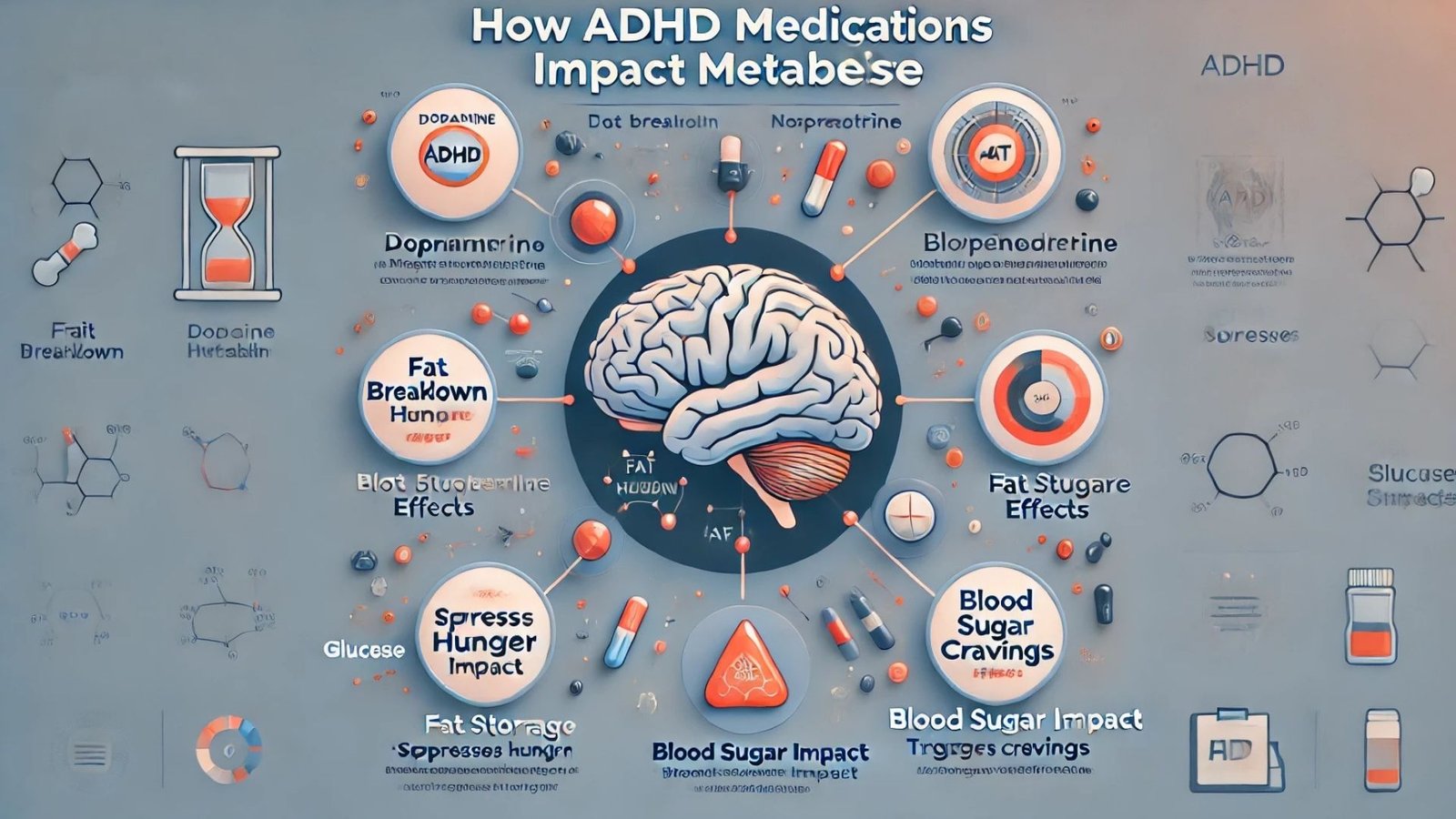Introduction – A Surprising Connection
If you or someone you know takes ADHD medication, you’re probably familiar with the improved focus, energy, and maybe even the appetite suppression. But did you know that these meds do more than just sharpen attention? They actually have a significant impact on metabolism—affecting fat burning, insulin sensitivity, and even blood sugar levels.
Dr. Ben Bikman, a leading expert in metabolic health, has been digging into the science behind how ADHD medications interact with our body’s metabolic systems. And what he’s found is pretty fascinating. In this post, we’ll break it down in a simple, relatable way—no PhD required!
Let’s explore how stimulant and non-stimulant ADHD medications influence your metabolism, appetite, fat storage, and even your brain’s ability to process energy efficiently.
ADHD Meds: The Two Main Players
ADHD medications fall into two major categories:
Stimulants (The Fast-Acting Focus Boosters)
These are the most commonly prescribed ADHD meds, including:
- Amphetamine-based drugs – Adderall, Vyvanse
- Methylphenidate-based drugs – Ritalin, Concerta
Stimulants work by increasing dopamine and norepinephrine levels in the brain, which help regulate focus, impulse control, and attention. But they also stimulate the sympathetic nervous system (a.k.a. the “fight or flight” system), which is where things get interesting for metabolism.
Non-Stimulants (The Slower, Steady Alternative)
For those who don’t tolerate stimulants well, non-stimulant options like Strattera (Atomoxetine) and Intuniv (Guanfacine) are available. These work differently—by affecting norepinephrine reuptake or adrenergic receptors—but they still have metabolic side effects worth understanding.
So, how do these medications mess with hunger, fat storage, and blood sugar? Let’s dive in.
Why ADHD Meds Kill Your Appetite (But May Trigger Binge Eating Later)
Ever taken an ADHD stimulant and realized you forgot to eat all day? That’s because these meds directly suppress hunger signals by altering activity in the hypothalamus, the brain’s appetite control center.
Short-Term Effects: Appetite Suppression
Stimulants reduce hunger, leading many users to eat less and even lose weight initially. For some, this might sound like a great side effect—but there’s a downside.
The Rebound Effect: Cravings for Sugar & Junk Food
Once the medication wears off, appetite often comes back with a vengeance. Studies suggest that stimulant users tend to crave high-sugar, high-fat foods later in the day. Why? Because these meds increase dopamine levels, and when they drop, the brain starts looking for a quick fix—like sugar.
Some people even experience binge eating episodes in the evenings, especially on high-carb foods. Sound familiar? This could be why.
Fat Burning vs. Fat Storage: How ADHD Meds Affect Your Body Composition
One of the most surprising effects of ADHD meds is how they interact with fat cells.
Stimulants: Fat Breakdown Boosters
Stimulants activate beta-adrenergic receptors in fat cells, which triggers lipolysis—aka fat breakdown. However, just because fat is broken down doesn’t mean it’s automatically burned for energy. If the released fatty acids aren’t used, they can be re-stored as fat later.
Key takeaway: Stimulants can put your body into fat-burning mode, but diet and insulin levels still determine whether that fat actually gets burned or re-stored.
Non-Stimulants: The Fat Storage Problem
On the other hand, some non-stimulant ADHD medications may encourage fat storage by reducing sympathetic nervous system activity. Instead of breaking down fat, they may slow fat metabolism—which could lead to weight gain over time.
If you’ve noticed unexpected weight changes while taking ADHD meds, this metabolic shift could be why!
Blood Sugar & Insulin Sensitivity: The Hidden Link
Most people don’t connect ADHD medications to blood sugar levels, but they absolutely should.
Stimulants Increase Blood Sugar
Stimulants trigger the liver to release stored glucose (glycogen) into the bloodstream. This can cause temporary spikes in blood sugar, which may not be ideal for people at risk of insulin resistance.
Non-Stimulants & Lower Blood Sugar
Some non-stimulant medications, like Guanfacine, reduce blood sugar levels by lowering sympathetic activity. While this might sound beneficial, it can also lead to low blood sugar episodes, making some users feel dizzy or lightheaded.
The big question: Could ADHD itself be related to metabolic issues like insulin resistance? Science says yes—which brings us to our next point.
Can Diet Help? The Role of Brain Metabolism in ADHD
What if part of the ADHD puzzle isn’t just about dopamine, but also about how the brain uses fuel?
Studies suggest that ADHD brains don’t use glucose as efficiently, especially in key regions like the prefrontal cortex (the area responsible for focus and impulse control).
This has led researchers to explore whether dietary strategies—such as reducing sugar intake or even trying a ketogenic diet—might help stabilize brain function.
Could Ketones Be the Answer?
Early research suggests that ketones (which the body produces in a low-carb, high-fat diet) may provide a more stable fuel source for the ADHD brain. One case study showed that a 13-year-old girl with ADHD saw dramatic improvements in focus and behavior after switching to a ketogenic diet.
This doesn’t mean keto is a cure for ADHD, but it does highlight how blood sugar stability and metabolic health might play a bigger role in ADHD symptoms than we previously thought.
Final Thoughts – A New Way to Look at ADHD & Metabolism
ADHD is typically seen as a brain disorder, but mounting evidence suggests metabolism plays a huge role in its symptoms.
From the way ADHD medications influence fat burning, appetite, and blood sugar, to the possibility that ADHD itself involves brain energy deficiencies, it’s clear that metabolism and brain function are deeply connected.
What Can You Do?
- Be mindful of your diet – Avoiding blood sugar spikes may help stabilize focus.
- Watch for metabolic side effects – If you’re gaining or losing weight unexpectedly, your medication could be a factor.
- Consider alternative energy sources – Some people report improved focus with stable blood sugar levels or even ketogenic approaches.
At the end of the day, understanding how ADHD and metabolism intersect can help you make better choices for your health—whether that means adjusting your diet, managing medication side effects, or simply being more aware of what’s happening in your body.
Would love to hear your thoughts—have you noticed changes in appetite, weight, or metabolism on ADHD meds? Let’s chat in the comments!

